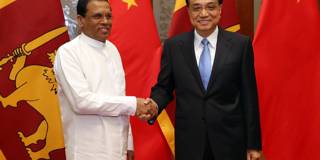In their country's parliamentary election this month, Sri Lankan voters will effectively decide whether their country should kowtow to China’s regional ambitions or shape its own destiny by promoting an independent foreign policy and an open economy. One hopes that they choose the latter option.
NEW DELHI – Sri Lanka’s parliamentary election this month promises to shape not only the country’s political future, but also geopolitics in the wider Indian Ocean region, a global center of trade and energy flows that accounts for half of the world’s container traffic and 70% of its petroleum shipments. The country’s strategic importance has not been lost on China, which has, to the dismay of India and the United States, been working hard to strengthen its presence in the Indian Ocean.
A leading contender in Sri Lanka’s upcoming election is former President Mahinda Rajapaksa, whose nine-year tenure, which ended in January with a shock defeat in the presidential election, was characterized by rising authoritarianism, nepotism, and corruption. To be sure, Rajapaksa brought an end to the 26-year Tamil insurgency in 2009, causing many in the country’s dominant Sinhalese community to view him as a hero. But it was a ruthless effort, during which Rajapaksa allegedly presided over war crimes, including the killing of up to 40,000 civilians in the final offensive against the Tamil rebels.
During Rajapaksa’s presidency, Sri Lanka’s relationship with India deteriorated, owing partly to his government’s failure to reconcile with the Tamil minority. (India has a sizeable Tamil population.) But the country’s relationship with China improved markedly, with Chinese firms winning a series of lucrative construction contracts that would secure Sri Lanka’s position as a key stop on China’s “maritime Silk Road” connecting Asia to Africa and the Middle East.

NEW DELHI – Sri Lanka’s parliamentary election this month promises to shape not only the country’s political future, but also geopolitics in the wider Indian Ocean region, a global center of trade and energy flows that accounts for half of the world’s container traffic and 70% of its petroleum shipments. The country’s strategic importance has not been lost on China, which has, to the dismay of India and the United States, been working hard to strengthen its presence in the Indian Ocean.
A leading contender in Sri Lanka’s upcoming election is former President Mahinda Rajapaksa, whose nine-year tenure, which ended in January with a shock defeat in the presidential election, was characterized by rising authoritarianism, nepotism, and corruption. To be sure, Rajapaksa brought an end to the 26-year Tamil insurgency in 2009, causing many in the country’s dominant Sinhalese community to view him as a hero. But it was a ruthless effort, during which Rajapaksa allegedly presided over war crimes, including the killing of up to 40,000 civilians in the final offensive against the Tamil rebels.
During Rajapaksa’s presidency, Sri Lanka’s relationship with India deteriorated, owing partly to his government’s failure to reconcile with the Tamil minority. (India has a sizeable Tamil population.) But the country’s relationship with China improved markedly, with Chinese firms winning a series of lucrative construction contracts that would secure Sri Lanka’s position as a key stop on China’s “maritime Silk Road” connecting Asia to Africa and the Middle East.